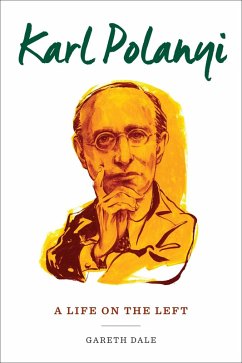Karl Polanyi (1886-1964) was one of the twentieth century's most original interpreters of the market economy. His penetrating analysis of globalization's disruptions and the Great Depression's underlying causes still serves as an effective counterargument to free market fundamentalism. This biography shows how the major personal and historical events of his life transformed him from a bourgeois radical into a Christian socialist but also informed his ambivalent stance on social democracy, communism, the New Deal, and the shifting intellectual scene of postwar America.
The book begins with Polanyi's childhood in the Habsburg Empire and his involvement with the Great War and Hungary's postwar revolution. It connects Polanyi's idealistic radicalism to the political promise and intellectual ferment of Red Vienna and the horror of fascism. The narrative revisits Polanyi's oeuvre in English, German, and Hungarian, includes exhaustive research in five archives, and features interviews with Polanyi's daughter, students, and colleagues, clarifying the contradictory aspects of the thinker's work. These personal accounts also shed light on Polanyi's connections to scholars, Christians, atheists, journalists, hot and cold warriors, and socialists of all stripes. Karl Polanyi: A Life on the Left engages with Polanyi's biography as a reflection and condensation of extraordinary times. It highlights the historical ruptures, tensions, and upheavals that the thinker sought to capture and comprehend and, in telling his story, engages with the intellectual and political history of a turbulent epoch.
Hinweis: Dieser Artikel kann nur an eine deutsche Lieferadresse ausgeliefert werden.
The book begins with Polanyi's childhood in the Habsburg Empire and his involvement with the Great War and Hungary's postwar revolution. It connects Polanyi's idealistic radicalism to the political promise and intellectual ferment of Red Vienna and the horror of fascism. The narrative revisits Polanyi's oeuvre in English, German, and Hungarian, includes exhaustive research in five archives, and features interviews with Polanyi's daughter, students, and colleagues, clarifying the contradictory aspects of the thinker's work. These personal accounts also shed light on Polanyi's connections to scholars, Christians, atheists, journalists, hot and cold warriors, and socialists of all stripes. Karl Polanyi: A Life on the Left engages with Polanyi's biography as a reflection and condensation of extraordinary times. It highlights the historical ruptures, tensions, and upheavals that the thinker sought to capture and comprehend and, in telling his story, engages with the intellectual and political history of a turbulent epoch.
Dieser Download kann aus rechtlichen Gründen nur mit Rechnungsadresse in A, D ausgeliefert werden.
Hinweis: Dieser Artikel kann nur an eine deutsche Lieferadresse ausgeliefert werden.
"Gareth Dale's book is the most erudite and theoretically comprehensive account of Polanyi's ideas that I have come across. This is above all an exercise in intertextuality and as such it is a remarkable example of intellectual dialogue." -- Keith Hart, Goldsmiths, University of London
"This will likely become the definitive book on Polanyi. In fact, it should be regarded and promoted as the definitive exposition of Polanyi's vision, ideas and the attendant debates. Gareth Dale combines a respectful and duly admiring attitude with unassailable theoretical erudition and clear-headed sobriety. The book also stands on its own as a serious contribution to current ideological debates and scholarly controversies regarding the prospects of post capitalist transitions." -- Georgi Derluguian, Northwestern University
"This will likely become the definitive book on Polanyi. In fact, it should be regarded and promoted as the definitive exposition of Polanyi's vision, ideas and the attendant debates. Gareth Dale combines a respectful and duly admiring attitude with unassailable theoretical erudition and clear-headed sobriety. The book also stands on its own as a serious contribution to current ideological debates and scholarly controversies regarding the prospects of post capitalist transitions." -- Georgi Derluguian, Northwestern University









